Apetamin Syrup and apetamin pill is a combination of appetite inducing pharmaceutical ingredient called cyproheptadine. It also contains lysine and vitamins.
The manufacturer wants it to be only for the use of a registered medical Practitioners, Hospitals or Laboratories. This is boldly written on the top of its leaflet inserted in each bottle of it.
Apetamin, however is one of the most abused drug especially by women who believe that it can help them add targeted weight at the, hips, buttocks and breasts.
In fact, a greater percentage of people who take Apetamin do so in a bid to enlarge their hips, buttocks and breasts. Targeted weight gain.

Well, only rocket science can achieve this and we are patiently for it. But for now, no known drug or Supplement can achieve targeted weight gain.
What we mean above is that Apetamin can NEVER make you or anyone achieve an enlarged hips, butts, or breasts by its usage.
Composition of Apetamin Syrup and Apetamin Pills
Each 5 ml of Apetamin Syrup and a capsule of the same product contains the following:
- Cyproheptadine Hydrochloride (anhydrous) BP 2 mg
- L-Lysine Hydrochloride USP 150 mg
- Thiamine Hydrochloride (Vitamin B1) 2 mg
- Pyridoxine HCl (Vitamin B6) BP 1 mg
- Nicotinamide (Vitamin B3) BP 15 mg
- Dexpanthenol (Pro Vitamin B5) BP 4.5 mg
Colour: Sunset Yellow FCF
Description of Apetamin Syrup and Apetamin Pills
Apetamin syrup and pills contain a unique combination of Cyproheptadine, Lysine and Vitamins. Cyproheptadine and Lysine being an essential and limiting amino acid helps to promote appetite.
Besides helping in the synthesis of collagen tissue. Lysine also helps to improve immunity during infancy, childhood & adolescence.
The water soluble vitamins in Apetamin being coenzymes helps to absorb the amino acid lysine through the intenstinal villi faster and assist in better utilization of Lysine.
They also improve immunity and help to correct marginal vitamin deficiency.

Pharmacokinetics of Apetamin Syrup and Apetamin Pills
After absorption from the gastrointestinal tract Cyproheptadine hydrochloride undergoes almost complete metabolisim in the liver.
Metabolites are excreted principally in the urine as conjugates, and also in the faeces.
Onset of action:
15 to 20 minutes after oral ingestion.
Indications and Uses of Apetamin
What is Apetamin Syrup and Apetamin Pills used for?
- Apetamin Syrup and Apetamin Pills are used in a case of loss of appetite and poor eating habits
- Anorexia after a brief illness
- Patients experiencing loss of appetite during convalescence following surgery or after any major illness.
Contraindications of Apetamin
There are no known contraindications.
However, do not use Apetamin together with other antihistamines and sedatives.
Symptoms and Treatment of overdosage
Antihistamine overdosage reactions may vary from central nervous system depression to stimulation especially in children.
Also, atropine like signs and symptoms (dry mouth, fixed, dilated pupils; flushing, etc.) as well as gastrointestinal symptoms may occur.
If vomiting has not occurred spontaneously, the patient should be induced to vomit with syrup of ipecac, If the patient is unable to vomit perform gastric lavage followed by activated charcoal Isotonic or half isotonic saline is the lavage of choice.
Precautions against aspiration must be taken especially in infant and children.
Pregnancy and lactation
Safety in pregnancy and lactation has not been established.
Warnings
Children: Overdosage of antihistamines, particularly in infants and children, may produce hallucinations, central nervous system depression and convulsion
Antihistamines may diminish mental alertness; conversely, particularly in the young child, they me occasionally produce excitation
CNS Depressants: Antihistamines may have additive effects with alcohol and other CNS depressants, e.g. hypnotics, sedatives, tranquilizers, antianxiety agents.
Activities Requiring Mental Alertness: Patients should be warned about engaging in activities requiring mental alertness and motor coordination, such as driving car or operating machinery Antihistamines are more likely to cause dizziness, sedation and hypotension in elderly patients.
Adverse reactions and precautions
Drowsiness to deep sleep, lassitude, dizziness and in-coordination may occasionally occur especially in high doses.
The sedative effect may diminish after a few days of treatment. It is suggested that the treatment is started with lower dose to begin with and increased gradually over a period of days.
Interactions of Apetamin with other drugs
Sedative antihistamine may enhance the sedative efforts of CNS depressants including alcohol, barbiturates, hypnotics, etc.
How Safe is Apetamin?
It is generally safe to use both in children and adults. But precaution should be taken while using other CNS depressants and sedatives
Dosage and administration of Apetamin Syrup and Apetamin Pills
Children
2-6 years: 5 ml, 2 to 3 times daily before food.
7-14 years: 10 ml, 2 to 3 times daily before food.
Adults: 10ml, 3 times daily before food.
Presentation:
In 200 ml, amber bottle with individual carton.
Store at a temperature not more than 30°C. Protect from light.
See Also: Klovinal pessary

How much is it to order this